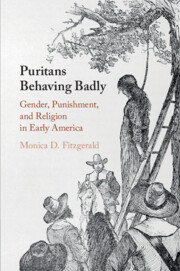Book contents
- Puritans Behaving Badly
- Puritans Behaving Badly
- Copyright page
- Dedication
- Contents
- Figures
- Tables
- Acknowledgments
- Introduction
- 1 The Great Hen Squabble and Regulating the Godly Path
- 2 Drunkards and Fornicators on Meeting House Hill
- 3 “Wicked Tongues and Wayward Behavior”
- 4 A “Blubbering” War Hero and the Middle Ground of Masculinity
- 5 “Unquiet Frame of Spirit”
- Conclusion
- Bibliography
- Index
Conclusion
Three Generations in the Wilderness: Gendered Puritanism and Separate Spheres
Published online by Cambridge University Press: 02 May 2020
- Puritans Behaving Badly
- Puritans Behaving Badly
- Copyright page
- Dedication
- Contents
- Figures
- Tables
- Acknowledgments
- Introduction
- 1 The Great Hen Squabble and Regulating the Godly Path
- 2 Drunkards and Fornicators on Meeting House Hill
- 3 “Wicked Tongues and Wayward Behavior”
- 4 A “Blubbering” War Hero and the Middle Ground of Masculinity
- 5 “Unquiet Frame of Spirit”
- Conclusion
- Bibliography
- Index
Summary
Puritanism was a feminized religion, with woman as normative. But through their control of disciplinary practices, laymen were able to reject the feminine aspects of faith for male members and redefine a masculine Puritanism that focused on communal duty instead of individual piety. Censures focused on women’s individual piety led to the development of a religious self; for men, they focused on public responsibility, leading men to express their religiosity in civic spaces. The Puritan “errand in the wilderness” had the potential to radically alter gender rules, as ministers and doctrine called for a feminized spirituality and believed that all souls were equal. However, laymen veered from clerical prescriptions and developed a gendered Puritanism that contributed to the creation of the modern gender ideology of separate spheres, where men occupied the important public spaces and women were relegated to the private sphere. By the end of the third generation, in which female membership was dominant, Puritanism lost its public power and was relegated to the private sphere, where it intensified its focus on the religious self and individual piety.
Keywords
- Type
- Chapter
- Information
- Puritans Behaving BadlyGender, Punishment, and Religion in Early America, pp. 136 - 148Publisher: Cambridge University PressPrint publication year: 2020

